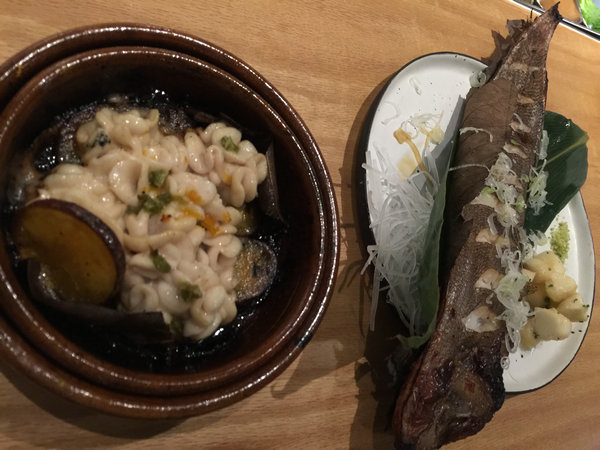Okra heads south
 |
|
Baked cod sperm and roasted mackerel[Photo by Mike Peters/ China Daily] |
Okra has been a Beijing sensation since Levy, now in his mid 30s, left his corporate toque behind at a boutique hotel to do his own thing in the capital's 1949 courtyard. Some of his fellow chefs whisper that he may be the one to bring a Michelin star to the mainland - chatter that evokes a chuckle from Levy.
"I don't wake up every morning thinking, 'What can I do to get a Michelin star?'," he recently told That's Beijing magazine, after the publication ranked Okra Beijing as the Restaurant of the Year for 2015. "But of course it would be awesome to win a Michelin star, especially as an American, because I remember when I was growing up, Michelin stars weren't in the US at all."
Among other things, Levy has been a local leader in what has become a globally popular trend, the nose-to-tail approach to fine dining. In a 2010 interview with China Daily, he pointed proudly to the fact that he doesn't buy pieces of meat, he buys whole animals.
"We use the head to make a terrine - like head cheese, you know - but we don't add gelatin like agar. We cook it down slowly with soy sauce, wine and duck fat, and it just mellows."
His eagerness to get the most out of an animal is reflected in his enthusiasm for freshwater eels, which appeared on his soft-opening set menu and lingers on the a la carte menu he's debuting this week.
"With most fish you waste about 30 percent," he says. "But with an eel almost everything gets eaten. It has a small digestive system. Small head. One bone. And most of the water stays in the meat."
Unlike the more spacious Okra in the capital's Sanlitun area, the Hong Kong space is long and narrow, at least on the ground floor: 12 barstools lined up against the counter of an open kitchen, and a few standing-room-only tables beyond. The result is a barlike atmosphere Levy likes - he and his Hong Kong chef de cuisine, Daniel Garner, are in chatting range of each diner, and chat they do. Upstairs, the just-opened sushi bar is also exclusive and intimate.
Some have wondered why Levy chose the site in the San Ying Pun area because it's a bit out of the way, but the chef-owner says that's exactly the point.
















